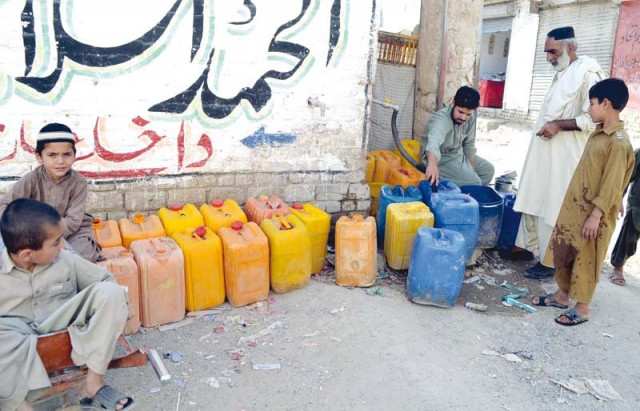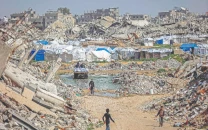Rawalpindi’s water reserves dwindle
Illegal hydrants drive underground water levels to alarming depths

As the scorching summer approaches, the shadow of a looming water crisis darkens over Rawalpindi. The underground water level has plummeted below 700 feet, a dire consequence of rampant mafia operations running illegal hydrants across the city, cantonment, and rural areas.
Millions of underground borings and wells teeter on the brink of drying up, spelling disaster for the residents as well as the region’s vegetation. Experts warn of catastrophic consequences if immediate action is not taken to curb the depletion of groundwater reserves.
Speaking anonymously to The Express Tribune, a senior officer from the Water and Sanitation Agency (Wasa) revealed the extent of the crisis. The illegal water trade has reached its zenith, with the district administration and allied departments appearing powerless against the influential mafia dominating this illicit business.
Water from these illicit sources is sold at exorbitant prices, exacerbating the plight of citizens already grappling with acute shortages. A single tanker, priced between Rs4,000 to Rs6,000, barely suffices for two days, pushing residents to the brink of financial strain.
The unchecked proliferation of illegal water trade spans numerous areas including Chakri Road, Adiala Road, Garja Road, Misrial Road, Chakra, Sadiqabad, Gulzar Quaid, Dhamiyal, Dhok Syedan, Dhok Chaudharyan, Peoples Colony, Tench, Harley Street, Lal Kurti, Tali Mohri and others, leaving citizens at the mercy of unscrupulous water profiteers.
The solution, as proposed by the official, lies in the implementation of robust government-led water schemes. “Only when citizens are provided with ample water through legitimate channels will the demand for illicit water diminish. However, relying solely on water from Rawal Dam or underground tube wells is insufficient,” he said.
“The Punjab government must expedite the construction of Daducha Dam and other critical infrastructure to alleviate the water crisis in Rawalpindi,” he suggested.
Ramzan Ahmad, a citizen affected by the crisis, lamented the monopolistic grip of the tanker mafia. With no regulatory control over pricing or water quality, citizens are left with no option but to succumb to the exploitative practices of the mafia.
As temperatures soar, the burden on citizens is expected to worsen, with tanker prices predicted to skyrocket to Rs15,000 during peak summer months, further exacerbating the suffering of the already marginalised.
Rawalpindi stands at a critical juncture, where decisive action is imperative to avert a full-blown humanitarian and environmental catastrophe. It is incumbent upon authorities to act swiftly and decisively to safeguard the future of the city and its inhabitants.



















COMMENTS
Comments are moderated and generally will be posted if they are on-topic and not abusive.
For more information, please see our Comments FAQ